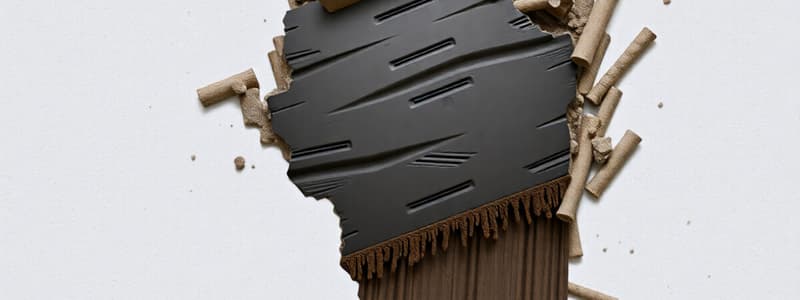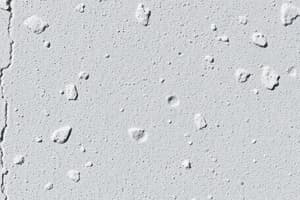Podcast
Questions and Answers
What characteristic of concrete makes it suitable for constructing seawalls and jetties?
What characteristic of concrete makes it suitable for constructing seawalls and jetties?
- Translucent appearance
- High thermal conductivity
- Lightweight nature
- Resistance to seawater (correct)
Which aspect of reinforced cement concrete contributes to its use in building foundations?
Which aspect of reinforced cement concrete contributes to its use in building foundations?
- Rapid curing time
- Low cost
- High load-carrying capacity (correct)
- Flexibility in design
What advantage does precast concrete offer over traditional concrete construction for fences?
What advantage does precast concrete offer over traditional concrete construction for fences?
- Longer curing time
- Faster production and installation (correct)
- Less durability
- Increased weight
Which type of concrete provides additional strength and durability in bridge construction?
Which type of concrete provides additional strength and durability in bridge construction?
What is a key benefit of using special concrete mixes for culverts and sewers?
What is a key benefit of using special concrete mixes for culverts and sewers?
Which type of concrete is designed to allow sunlight to pass through?
Which type of concrete is designed to allow sunlight to pass through?
What type of concrete is known for its ability to compress and hold shape without external vibration?
What type of concrete is known for its ability to compress and hold shape without external vibration?
Which type of concrete incorporates plastic for enhanced performance and durability?
Which type of concrete incorporates plastic for enhanced performance and durability?
Which concrete type is specifically designed to repair itself using living organisms?
Which concrete type is specifically designed to repair itself using living organisms?
What characterizes high strength concrete compared to normal concrete?
What characterizes high strength concrete compared to normal concrete?
What is the main component that initiates the hardening process in concrete?
What is the main component that initiates the hardening process in concrete?
Which characteristic of concrete is known for being very high?
Which characteristic of concrete is known for being very high?
Which of the following lists includes all main constituents of concrete?
Which of the following lists includes all main constituents of concrete?
What is a significant disadvantage of concrete?
What is a significant disadvantage of concrete?
Concrete is categorized primarily based on its?
Concrete is categorized primarily based on its?
What property of concrete should be maximized to enhance its durability?
What property of concrete should be maximized to enhance its durability?
Which application does concrete NOT typically serve?
Which application does concrete NOT typically serve?
Which ingredient in concrete serves as the primary binding agent?
Which ingredient in concrete serves as the primary binding agent?
What is a primary advantage of using concrete in construction?
What is a primary advantage of using concrete in construction?
Which of the following is considered a disadvantage of concrete?
Which of the following is considered a disadvantage of concrete?
In which type of construction is concrete especially suitable due to its ability to resist intense water pressure?
In which type of construction is concrete especially suitable due to its ability to resist intense water pressure?
What characterizes concrete as quasi-brittle?
What characterizes concrete as quasi-brittle?
What is a common application for concrete that demonstrates its durability?
What is a common application for concrete that demonstrates its durability?
Which of the following is NOT a characteristic of concrete?
Which of the following is NOT a characteristic of concrete?
Which aspect of maintenance is notable when using concrete?
Which aspect of maintenance is notable when using concrete?
What is a disadvantage concerning the physical properties of concrete?
What is a disadvantage concerning the physical properties of concrete?
Flashcards are hidden until you start studying
Study Notes
What is Concrete?
- Concrete is a composite material made from aggregates, sand, cement, and water.
- Concrete is cast into small units, including bricks and blocks, used in construction.
- Concrete also makes foundations, floors, columns, beams, and walls.
Constituents of Concrete
- Cement, water, fine aggregate, coarse aggregate, and admixtures are the constituents of concrete.
- Fine and coarse aggregates are inert, while cement and water are active.
- Hydration occurs when cement and water mix, causing concrete to harden.
Concrete Characteristics
- Concrete has high compressive strength (ability to resist compression) and low tensile strength (ability to resist stretching, bending, or twisting).
- Durability refers to a material’s resistance to deterioration, which is affected by its strength and exposure to conditions.
- Concrete is strong and fire-resistant, and can be made weather-resistant and watertight to withstand exposure.
Advantages of Concrete
- Concrete can be cast into various shapes.
- It is economical.
- It is durable.
- It is energy-efficient.
- It is fabricated onsite.
- It resists water well.
- It resists high temperatures for 2-6 hours.
- It has low maintenance requirements.
- Can include waste products like wood ash, fly ash, rice husk ash, and plastic in the mix.
Disadvantages of Concrete
- Concrete has low tensile strength.
- It has a quasi-brittle failure mode (breaks suddenly without warning).
- It has low ductility (resistance to deformation).
- Concrete is prone to volume instability (expansion and contraction).
- It has a low strength-to-weight ratio.
- It requires formwork (molds for casting).
- It has a long curing time.
- Concrete can crack.
Applications of Concrete
- Dams: Concrete’s strength and density make it suitable for the construction of dams.
- Residential Buildings: Concrete is used in the construction of small to high-rise residential buildings.
- Commercial Buildings: Concrete is a safer, more economic, and easier material for commercial buildings.
- Roads/Driveways: Concrete streets, pavements, and driveways are more durable than asphalt.
- Marine Construction: Concrete is a versatile material for seawalls, jetties, groins, breakwaters, bulkheads, and other marine structures.
- Culverts and Sewers: Concrete's strength makes it suitable for culverts, piers, foundations, and abutments.
- Foundations: High-rise and low-rise building foundations are often made of reinforced concrete.
- Fences: Precast concrete is fast and attractive for fence construction.
- Bridges: Concrete’s strength, durability, and weather resistance make it suitable for bridges.
Types of Concrete
- Normal Concrete: Basic concrete mix.
- High Strength Concrete: Concrete with enhanced compressive strength.
- Self-Compacting Concrete: Concrete that doesn't require vibration to compact, making it suitable for complex shapes.
- Self-Cleaning Concrete: Reduces the need for cleaning by using photocatalytic surfaces.
- Polymer Concrete: Concrete combined with polymers for improved impact resistance and other properties.
- Recycled Aggregate Concrete: Uses recycled aggregates for a more sustainable concrete.
- Autoclaved Aerated Concrete: Lightweight concrete with good thermal insulation properties.
- Lightweight Concrete: Concrete made with lighter aggregate materials.
- Flexible Concrete: Concrete with flexible properties.
- Bio Concrete: Concrete made with microbial agents to reduce the need for cement.
- Fiber Reinforced Concrete: Concrete that contains fibers for improved strength and durability.
- Ferrocement: Concrete reinforced with steel mesh or wire.
- Previous Concrete: Concrete made from previous concrete.
- Translucent Concrete: Concrete that transmits light.
Studying That Suits You
Use AI to generate personalized quizzes and flashcards to suit your learning preferences.



